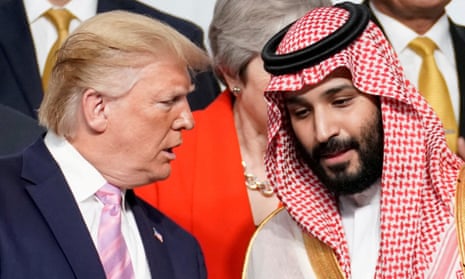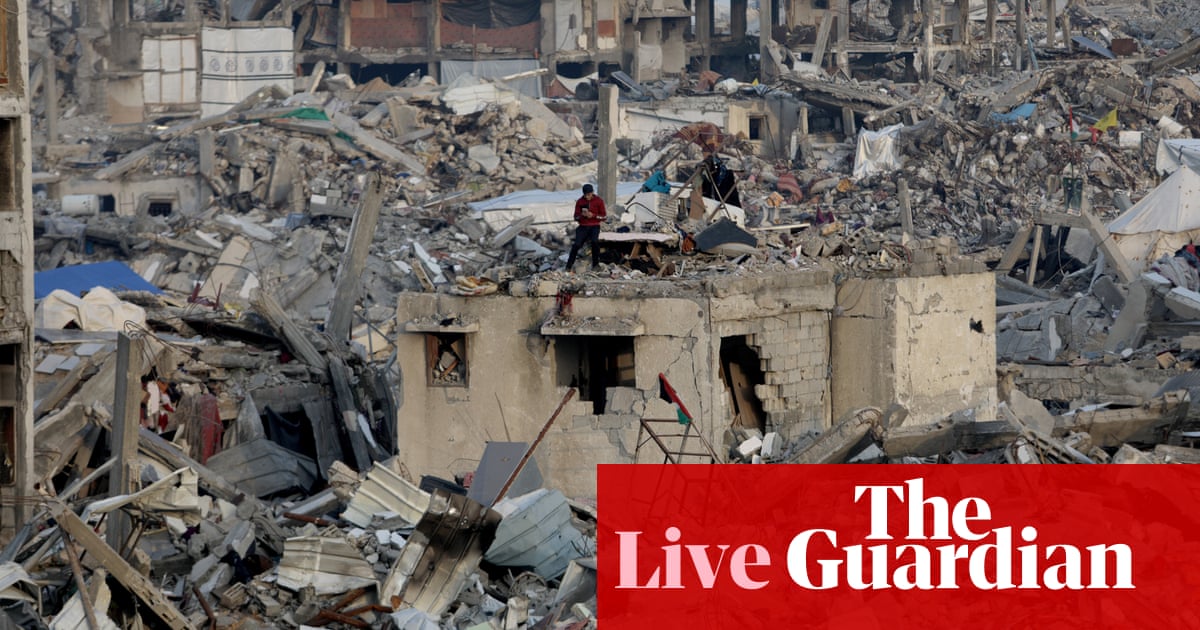Israel dispatches negotiating team to Cairo to discuss hostage deal as Marco Rubio heads to Saudi Arabia
Hello and welcome to the Guardian’s live coverage of developments in the Middle East.
The US secretary of state, Marco Rubio, is on Monday due to visit Riyadh, Saudi Arabia, a key player in Donald Trump’s regional strategy.
Rubio is expected to meet Crown Prince Mohammed bin Salman (MBS). It is not clear when this meeting will take place as the US secretary of state is also in Saudi Arabia for talks with Russian officials aimed at ending the war in Ukraine.
But somewhere on the agenda is likely to be Donald Trump’s plans to move millions of Palestinians out of their territories in Gaza and the occupied West Bank to neighbouring countries such as Egypt and Jordan – a proposal widely condemned as an endorsement of ethnic cleansing.

Saudi Arabia, alongside other Arab nations, has rejected any plan that involves resettling Palestinians, and Riyadh is spearheading Arab efforts to develop a counterproposal, which could involve a Gulf-led reconstruction fund and a deal to sideline Hamas.
MBS has also insisted that Saudi Arabia would not normalise ties with Israel – a longstanding goal of Washington – without an agreement on a pathway to a Palestinian state. After Riyadh, Rubio is scheduled to travel to the United Arab Emirates on the final leg of his Middle East tour.
Israeli prime minister Benjamin Netanyahu said yesterday that his government is working closely with the US to implement Trump’s Gaza “take over” proposal, which involves US ownership of the coastal strip and the redevelopment of the occupied territory as a resort.
Netanyahu was speaking after a meeting in Jerusalem with Rubio, who said Trump’s proposal may have “shocked” some people, but it took “courage” to suggest an alternative to “tired ideas” of the past.
According to the prime minister’s office, Netanyahu has instructed a negotiating team to head to Cairo today for talks on the continuation of the first phase of the fragile ceasefire agreement with Hamas.
“Following tomorrow’s security cabinet discussion, the team will receive instructions for the continuation of the negotiations regarding the second stage,” the statement from Netanyahu’s office read yesterday.
According to my colleague Julian Borger, the Israeli government is reportedly seeking to change the terms of the agreement with Washington’s backing. It is calling for the six surviving hostages who remain in Gaza scheduled to be released in the first phase of the agreement to be freed all at once next Saturday, rather than in two groups of three over the final two weeks of the first phase, which ends on 1 March.
In some other developments:
-
Israel has received a shipment of heavy MK-84 bombs from the US, after Trump lifted a block imposed on the export of the munitions by the administration of his predecessor, Joe Biden, the defence ministry said on Sunday. The MK-84 is an unguided 2,000 pound bomb, which can rip through thick concrete and metal, creating a wide blast radius.
-
Israel’s far-right finance minister, Bezalel Smotrich, said on Saturday night that he hoped the mass transfer of Palestinians from Gaza endorsed by Trump could begin soon. He said he expected Palestinians would be forced to leave by a resumption of bombing.
-
Israeli forces yesterday injured 13 people during a raid on the Nur Shams refugee camp – on the eastern edge of the West Bank city of Tulkarm – according to reports.
Key events
The Associated Press has a breakdown of deaths, injuries and damage to infrastructure caused during Israel’s war on Gaza, which was launched following the Hamas-led attack on 7 October 2023 on southern Israel, in which about 1,200 people were killed and 251 taken hostage. Today is technically the 500th day of the war though there is a ceasefire, which came into effect on 19 January 2025, which has seen a pause in fighting.
-
Hostages remaining in Gaza: 73, including 3 taken before 7 October 2023
-
Hostages in Gaza believed to be dead: 36, including one from before 7 October 2023
-
Palestinians killed in Gaza by Israeli attacks: Over 48,200, according to Gaza’s health ministry
-
Palestinians injured in Gaza by Israeli attacks: Over 111,600
-
Israeli soldiers killed since 7 October 2023: 846
-
Rockets fired at Israel from Gaza since 7 October 2023: Over 10,000
-
Percentage of Gaza’s population displaced: Around 90%
-
Israelis displaced by attacks from Gaza and Hezbollah in Lebanon at their peak: Over 75,500
-
Housing units damaged or destroyed in Gaza: Over 245,000
-
Primary roads damaged or destroyed in Gaza: Over 92%
-
Health facilities damaged or destroyed in Gaza: Over 84%
-
Palestinians who have crossed into northern Gaza since the ceasefire began: 586,000
Egypt draws up Gaza reconstruction plan that would exclude Hamas

Patrick Wintour
Patrick Wintour is diplomatic editor for the Guardian
An alternative to Donald Trump’s plan to turn the Gaza Strip into a US-owned “Riviera of the Middle East” is being prepared by Egypt in conjunction with the World Bank, under which Hamas would be formally excluded from governance and control of the territory’s reconstruction.
The process would be handed over on an interim basis to the control of a social or community support committee. No member of Hamas would sit on the committee.
But the future military status of Hamas within Gaza is unresolved, which is likely to be a barrier to Israeli endorsement of the plan.
Arab states – principally the United Arab Emirates and Qatar – are preparing to make financial offers to fund reconstruction, but on the basis that Palestinians are given the right to remain in Gaza and are not forced to seek temporary or permanent refuge in Egypt or Jordan.
Reconstruction would take three to five years, with 65% of the property in Gaza having been destroyed.
European sources admit the issue of providing security guarantees to Israel for Gaza remains unresolved since no Arab country is willing to offer troops in the absence of Israel offering a clear political horizon to a Palestinian state.
You can read the full story here:
Israel dispatches negotiating team to Cairo to discuss hostage deal as Marco Rubio heads to Saudi Arabia
Hello and welcome to the Guardian’s live coverage of developments in the Middle East.
The US secretary of state, Marco Rubio, is on Monday due to visit Riyadh, Saudi Arabia, a key player in Donald Trump’s regional strategy.
Rubio is expected to meet Crown Prince Mohammed bin Salman (MBS). It is not clear when this meeting will take place as the US secretary of state is also in Saudi Arabia for talks with Russian officials aimed at ending the war in Ukraine.
But somewhere on the agenda is likely to be Donald Trump’s plans to move millions of Palestinians out of their territories in Gaza and the occupied West Bank to neighbouring countries such as Egypt and Jordan – a proposal widely condemned as an endorsement of ethnic cleansing.
Saudi Arabia, alongside other Arab nations, has rejected any plan that involves resettling Palestinians, and Riyadh is spearheading Arab efforts to develop a counterproposal, which could involve a Gulf-led reconstruction fund and a deal to sideline Hamas.
MBS has also insisted that Saudi Arabia would not normalise ties with Israel – a longstanding goal of Washington – without an agreement on a pathway to a Palestinian state. After Riyadh, Rubio is scheduled to travel to the United Arab Emirates on the final leg of his Middle East tour.
Israeli prime minister Benjamin Netanyahu said yesterday that his government is working closely with the US to implement Trump’s Gaza “take over” proposal, which involves US ownership of the coastal strip and the redevelopment of the occupied territory as a resort.
Netanyahu was speaking after a meeting in Jerusalem with Rubio, who said Trump’s proposal may have “shocked” some people, but it took “courage” to suggest an alternative to “tired ideas” of the past.
According to the prime minister’s office, Netanyahu has instructed a negotiating team to head to Cairo today for talks on the continuation of the first phase of the fragile ceasefire agreement with Hamas.
“Following tomorrow’s security cabinet discussion, the team will receive instructions for the continuation of the negotiations regarding the second stage,” the statement from Netanyahu’s office read yesterday.
According to my colleague Julian Borger, the Israeli government is reportedly seeking to change the terms of the agreement with Washington’s backing. It is calling for the six surviving hostages who remain in Gaza scheduled to be released in the first phase of the agreement to be freed all at once next Saturday, rather than in two groups of three over the final two weeks of the first phase, which ends on 1 March.
In some other developments:
-
Israel has received a shipment of heavy MK-84 bombs from the US, after Trump lifted a block imposed on the export of the munitions by the administration of his predecessor, Joe Biden, the defence ministry said on Sunday. The MK-84 is an unguided 2,000 pound bomb, which can rip through thick concrete and metal, creating a wide blast radius.
-
Israel’s far-right finance minister, Bezalel Smotrich, said on Saturday night that he hoped the mass transfer of Palestinians from Gaza endorsed by Trump could begin soon. He said he expected Palestinians would be forced to leave by a resumption of bombing.
-
Israeli forces yesterday injured 13 people during a raid on the Nur Shams refugee camp – on the eastern edge of the West Bank city of Tulkarm – according to reports.












